theartsdesk at the East Neuk Festival: Littoral Schubertiad | reviews, news & interviews
theartsdesk at the East Neuk Festival: Littoral Schubertiad
theartsdesk at the East Neuk Festival: Littoral Schubertiad
All-day Schubert by the sea and a Sibelius symphony in a working potato barn
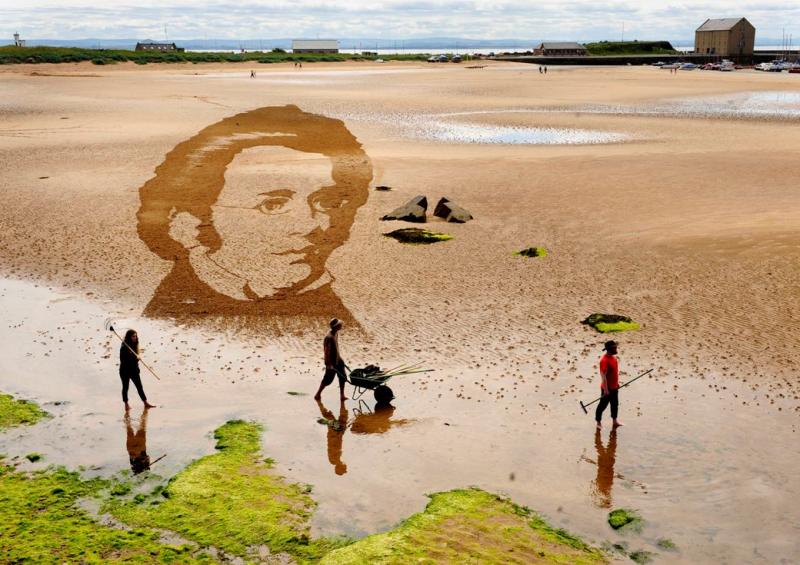
Schubert played and sung through a long summer day by the water: what could be more enchanting? The prospect did not take into account the pain in that all too short-lived genius’s late work: when interpreted by a world-class trio, quartet and pianists at the 10th East Neuk Festival, it could be exhausting.
Grey skies lifted by early afternoon, leaving the sun to bring out the honey colour of much of the local stone against clear deep blue skies. The best fish and chips in a garden by the sea, more seafood at a light supper in a café-restaurant with a lifesize rhinoceros in sand lying guard by the entrance: these were as much a part of the East Neuk Festival as the highest-level music-making.
Literature, too, on a day when you had to make choices. Frankly, given my own indifference to Kirsty Wark as well as a devotion to Schubert, that wasn’t difficult: but the great prose poet of wild places Robert Macfarlane was also down the road at Cambo House, and he was to offer the epilogue for the punning Littoral 2014 festival of words in another church the following morning. Cambo was my base, a room in the Victorian pile’s clock tower which turned out, according to a fairly recent discovery of the genial laird Sir Peter Erskine, to have incarcerated his grandmother, maybe suffering from post-natal depression, for some years before she was bundled off to Roehampton. So at least I was spared Mrs Rochester creeps by the fact that she didn’t die in the wing that had, it seemed, been built for her after the founding of the rest of the house in 1881 (the previous building was accidentally burnt down by servants having too good a time in their master and mistress’s absence).
T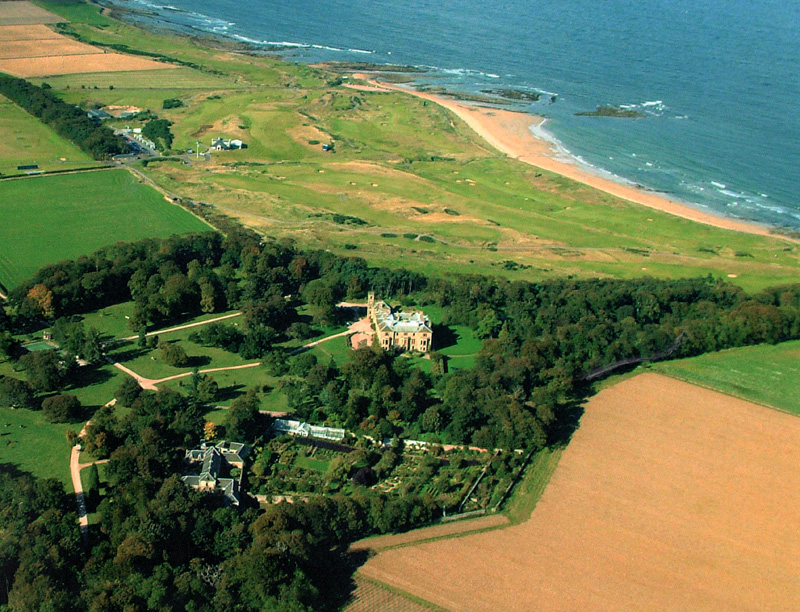 he situation of the Cambo Estate is one of the most beautiful I’ve ever enjoyed – and a practical place admirably run, too, to include a stables project to develop rustic skills and social programmes to help lost youth back to a path of useful activity. Its huge walled garden is one of the finest in Britain, cut through by purling streams and riotous with poppy beds in mid-July. Cattle and Skyrian horses with their foals roam near the house; free range pigs snuffle around in the woods.
he situation of the Cambo Estate is one of the most beautiful I’ve ever enjoyed – and a practical place admirably run, too, to include a stables project to develop rustic skills and social programmes to help lost youth back to a path of useful activity. Its huge walled garden is one of the finest in Britain, cut through by purling streams and riotous with poppy beds in mid-July. Cattle and Skyrian horses with their foals roam near the house; free range pigs snuffle around in the woods.
A tree-rich glen, in spring a riot of snowdrops which galanthophile Lady Catherine tends and the bulbs of which she sends out in a successful mail-order business, runs down to the sandy beaches. If you stick to the shoreline you can imagine yourself in the wilds and ignore the somehow not too inappropriate golf courses behind. It was a special place at 10.30pm on my first evening, where I took two friends visiting from Edinburgh, three glasses and a bottle of wine to be enjoyed on the rocks.
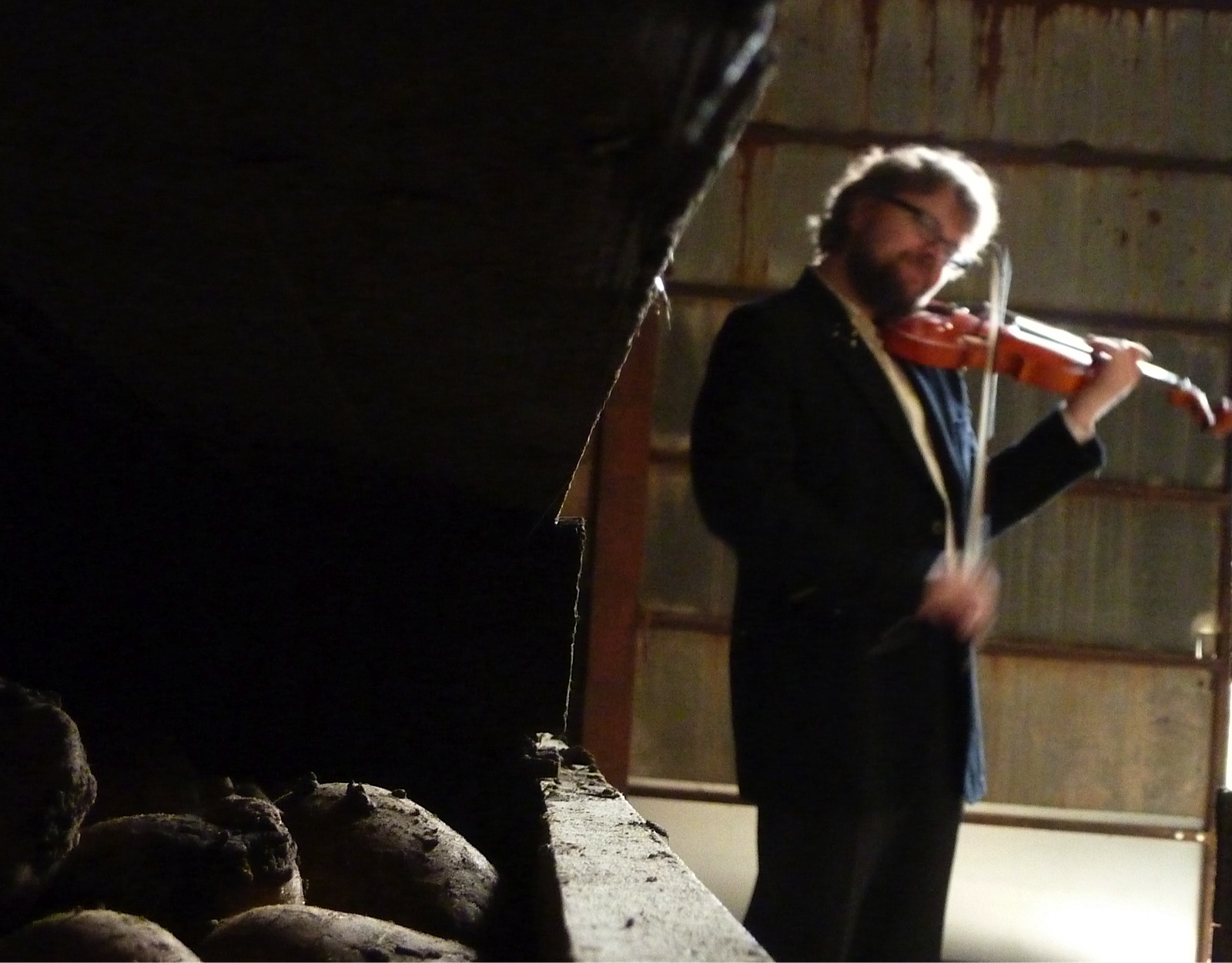 But I’m here to extol the music, which on the first evening meant a short walk to the potato barn in the middle of the estate’s very much working farm. By trial and error, the genial festival director and excellent speaker Svend Brown discovered that, once the spud boxes had been moved out (regular East Neuk Festival visitor Alexander Janiczek pictured) and a reasonable semblance of a concert hall had been created, the acoustics were amazingly good for the festival’s top core ensemble, the Scottish Chamber Orchestra.
But I’m here to extol the music, which on the first evening meant a short walk to the potato barn in the middle of the estate’s very much working farm. By trial and error, the genial festival director and excellent speaker Svend Brown discovered that, once the spud boxes had been moved out (regular East Neuk Festival visitor Alexander Janiczek pictured) and a reasonable semblance of a concert hall had been created, the acoustics were amazingly good for the festival’s top core ensemble, the Scottish Chamber Orchestra.
A great orchestra, a wonderful programme of old and new. It began with Í (A Meditation on Iona) by our – I can as yet include Scotland in Britain – most consistently brilliant living composer, James MacMillan (that’s my opinion, anyway). I’d just missed the premiere of his Piano Trio, an East Neuk Festival commission, played twice that afternoon, but there he was at a Cambo reception, as open to conversation and as seemingly diffident as ever. Scots veteran critic Kenneth Walton had dropped the surprise that it was MacMillan who had conducted the Edinburgh University Opera production of Gluck’s Alceste in my first year there (MacMillan’s last, and as I wasn’t in the music faculty we never met). Of course I wouldn't have spotted incipient greatness then. Not only that, the budding young composer had also written music for the Bedlam Theatre Company, which took up most of my time in terms one and two: he told me he’d just dug out the score for A Midsummer Night’s Dream in his attic. Worth reviving? He was thinking about it. How perfect that would be for Cambo, but I suspect he might want it for his own rural Scots festival, launching this October.
The Iona Meditation is mood music that goes somewhere, with typically consummate string writing. John Luther Adams, whose percussion piece around the walled garden seems to have been the hit of the last festival, merely creates atmosphere in …and bells remembered…, but it was evocative enough with the percussionists placed around the barn. A blackbird sang nearby, and a light shower of rain on the roof obliged for the coda.
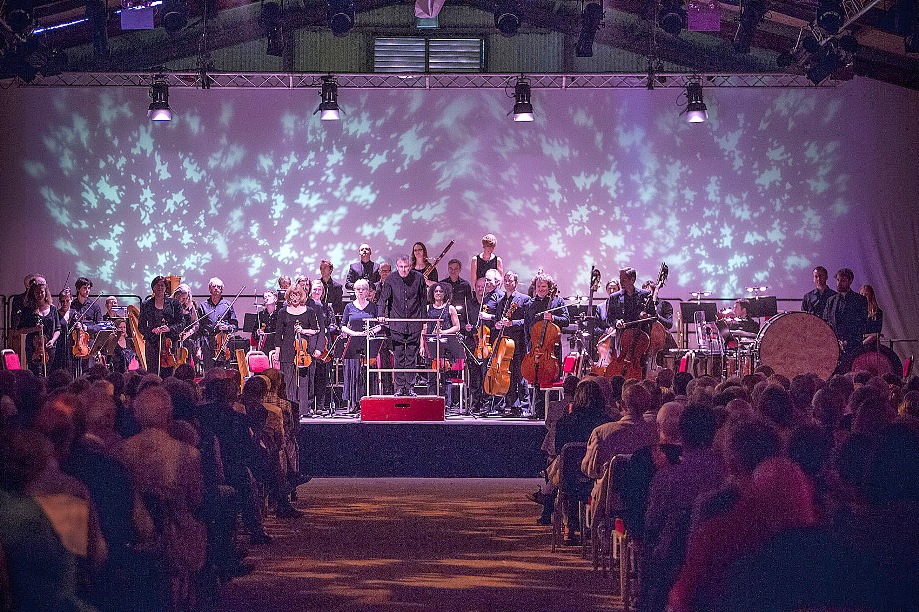 With Britten’s Les Illuminations, Allan Clayton hardly needed to prove that he is one of at least four young tenors we can now call upon as idiomatic interpreters (the others are Ben Johnson, Robin Tritschler and Andrew Staples, who as Allan told me in the car back to the airport was his flatmate for several years: no jealous rivalry there – and as they all know their own worth, why should there be?) He can do the luminous magic of Britten’s most radiant love song, “Antique”, for young Wolf Scherchen, and the full flares for Rimbaud’s most outlandish imagery. If his Serenade in the closing concert (Christian Zacharias with the SCO pictured above), executed with brilliant 28-year old SCO horn principal Alec Frank-Gemmill at the very highest level, didn’t banish memories of Tritschler with the Britten Sinfonia a year ago, it was only because that performance had been in the woods of Britten’s old school, Gresham’s in Norfolk, where the final offstage horn calls resounded from the beeches behind the stage.
With Britten’s Les Illuminations, Allan Clayton hardly needed to prove that he is one of at least four young tenors we can now call upon as idiomatic interpreters (the others are Ben Johnson, Robin Tritschler and Andrew Staples, who as Allan told me in the car back to the airport was his flatmate for several years: no jealous rivalry there – and as they all know their own worth, why should there be?) He can do the luminous magic of Britten’s most radiant love song, “Antique”, for young Wolf Scherchen, and the full flares for Rimbaud’s most outlandish imagery. If his Serenade in the closing concert (Christian Zacharias with the SCO pictured above), executed with brilliant 28-year old SCO horn principal Alec Frank-Gemmill at the very highest level, didn’t banish memories of Tritschler with the Britten Sinfonia a year ago, it was only because that performance had been in the woods of Britten’s old school, Gresham’s in Norfolk, where the final offstage horn calls resounded from the beeches behind the stage.
But the potato barn is a hit, no doubt about it. Who would have thought that Sibelius’s Seventh Symphony, calling upon unusually expanded forces for the SCO, could have rippled so translucently in such a venue? This, one of the ultimate tests for a conductor’s flexibility and control, proved definitively that young Clemens Schuldt, winner of the 2010 Donatella Flick Conducting Competition, has all the mastery it takes (I’ve heard famous maestros make a mess of the work by comparison). Perhaps the interpretation could have done with just a touch more air, but the cornerstone trombone solos were magnificent, the transitions impeccably handled.
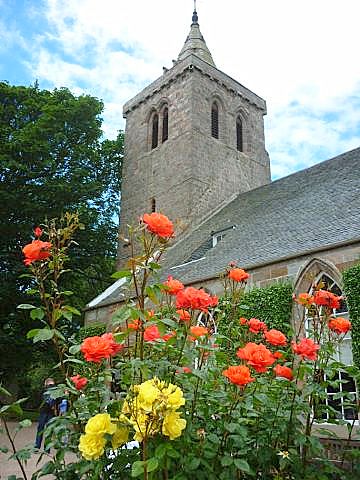
Break, lunch. The picnic boxes ordered by our wonderful chaperone Debra Boraston hadn’t arrived; fish and chips taken back to her place seemed the sensible option. Whilst the orders fried, we stood outside admiring the sand rhinoceros which, like the Schubert portrait, had been so lovingly crafted by the now-familiar Sand In Your Eye team (pictured below) and listened to an expert young brass ensemble, part of the admirable Live Music Now Scotland scheme administered by Carol Main, who was there leafleting vigorously.
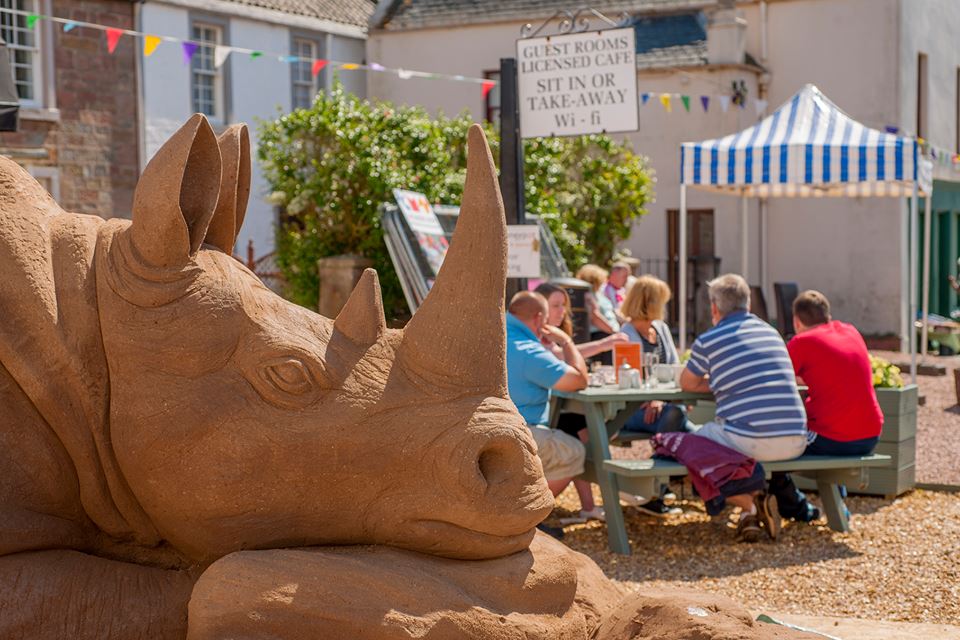 So we watched the skies clear as we ate our lunch and found ourselves serenaded by the Belcea Quartet, warming up in the house. There was so much profundity in the Schubert interpretations on offer, but I’d single out their extraordinarily refined and introspective “Rosamunde” Quartet (the A minor, D804) as one of the two emotional highlights of the day. How extraordinary is Schubert’s irresolute so-called Menuetto, gliding briefly into consolation, ending in a question mark, and how much Brahms must have learnt from it in his subtlest chamber music.
So we watched the skies clear as we ate our lunch and found ourselves serenaded by the Belcea Quartet, warming up in the house. There was so much profundity in the Schubert interpretations on offer, but I’d single out their extraordinarily refined and introspective “Rosamunde” Quartet (the A minor, D804) as one of the two emotional highlights of the day. How extraordinary is Schubert’s irresolute so-called Menuetto, gliding briefly into consolation, ending in a question mark, and how much Brahms must have learnt from it in his subtlest chamber music.
This was a concert of two very distinct halves: in the first, Llŷr Williams played the D899 Impromptus as the intense sequence they ought to be: the famous G flat Reverie is just pretty out of context, but if it comes after the spinning E flat scherzo with its plunges into a demonic minor key which ends the piece, everything makes sense. This is a four-movement symphony for piano. I spoke to the intense and very likeable Williams at the Macfarlane event the following morning: he has very clear ideas of a full Schubert sonata sequence he’d like to play, not the usual trilogy of the last three.He also expanded on what I'd heard, that the first revelatory concert of his Welsh youth had been with Christian Zacharias, the Schubert doyen of our day, in a Mozart concerto. He'd had the programme signed then, and thought he might ask Zacharias to do the same again.
We needed some respite from all this, and after a quick trip to see the lovely church right by the sea at St Monans courtesy of Debra, we got it in the lighter third programme. Williams and his soprano, Malin Christensson, had chosen an inspired song sequence. But Christensson’s delivery was variable, her technique rather peculiar, sometimes gusty and not best suited to legato lines in songs like “Du bist die Ruh” and “An die Musik”. She certainly has the musicality to make the most of a quirky Lied like “Ganymed”, though, and delighted the audience in trio with Williams and liquid SCO clarinetist Maximiliano Martín for the showy Italianate scena of “The Shepherd on the Rock”. Belcea first violin Corina and cellist Antoine Lederlin formed another triumvirate, with festival regular Zacharias making his first appearance of the day (the three pictured below). I hadn’t remembered Schubert’s B flat Piano Trio being so much lighter than its E flat companion, but at a late afternoon time when heads were inclined to nod, the vivacious performance kept us happy.
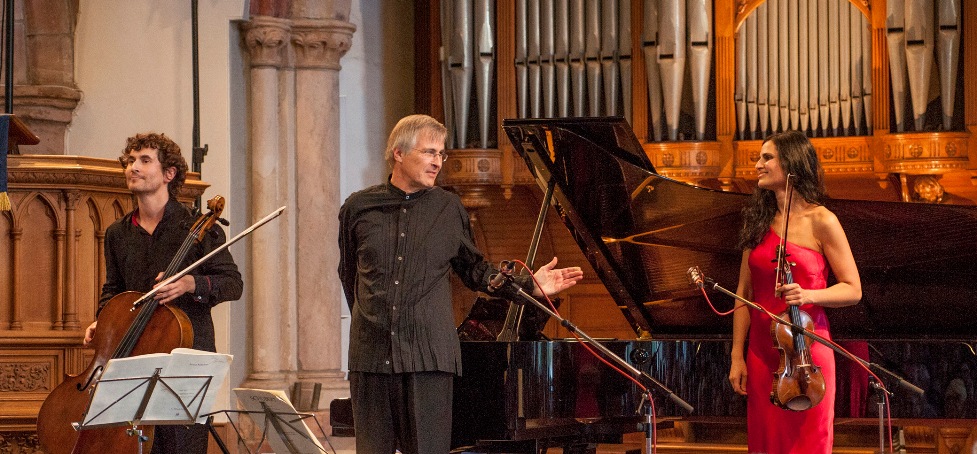
As did the Arpeggione Sonata with Belcea viola-player Krzystof Chorzelski and Zacharias: focus and lightness were all we needed here. Then it was time to gird spiritual resources to face the death-haunted majesty of the last piano sonata, the B flat masterpiece D960. I’d wondered if it would be impossible to adjust to Zacharias’s Schubert-on-the-move after the very slow meditations of Sviatoslav Richter, idiosyncratic interpreter of a desert-island work for me. But this is the kind of pianistic discipline which keeps the emotion implicit so that the impact is no less hard-hitting. Is the Andante sostenuto the saddest music in the world? It felt so here. And just as one feels the heart might break, Schubert brings us out into the light. There is no greater inspiration to bring consolation to grief, and no finer pianist alive than Zacharias to modulate it so well.
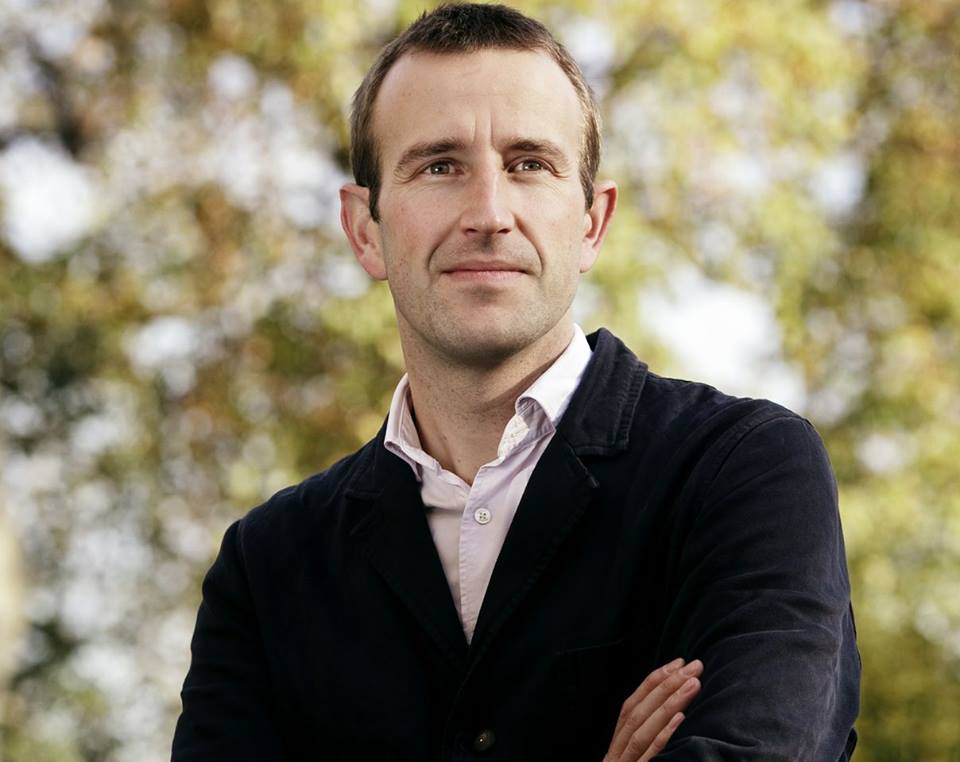 Sunday provided a mostly lighter coda: I know that the “Unfinished” Symphony ought to move me, but even in the masterly hands of Zacharias the conductor, it leaves me listening intently but from a distance. That morning in Kilrenny Church, which feels like a white, light lecture theatre, Robert Macfarlane (pictured left) proved in conversation that the eloquent style of his nature writing is the man himself. Unless he’d learned all the best phrases by heart, what came out in engaging speech was just as finely inflected. He spoke of our footpaths and public spaces as a “labyrinth of liberty”; he reminded us how his mentor, the late lamented Roger Deakin, had taught him to inspect “the undiscovered country of the nearby”. and he was thoughtful on the relationship between language and landscape. I bought two books afterwards I hadn’t read, and one as a present: Macfarlane was gracious and attentive throughout the signing while the rest of the audience consumed the local ladies’ cakes with tea next door in the village hall.
Sunday provided a mostly lighter coda: I know that the “Unfinished” Symphony ought to move me, but even in the masterly hands of Zacharias the conductor, it leaves me listening intently but from a distance. That morning in Kilrenny Church, which feels like a white, light lecture theatre, Robert Macfarlane (pictured left) proved in conversation that the eloquent style of his nature writing is the man himself. Unless he’d learned all the best phrases by heart, what came out in engaging speech was just as finely inflected. He spoke of our footpaths and public spaces as a “labyrinth of liberty”; he reminded us how his mentor, the late lamented Roger Deakin, had taught him to inspect “the undiscovered country of the nearby”. and he was thoughtful on the relationship between language and landscape. I bought two books afterwards I hadn’t read, and one as a present: Macfarlane was gracious and attentive throughout the signing while the rest of the audience consumed the local ladies’ cakes with tea next door in the village hall.
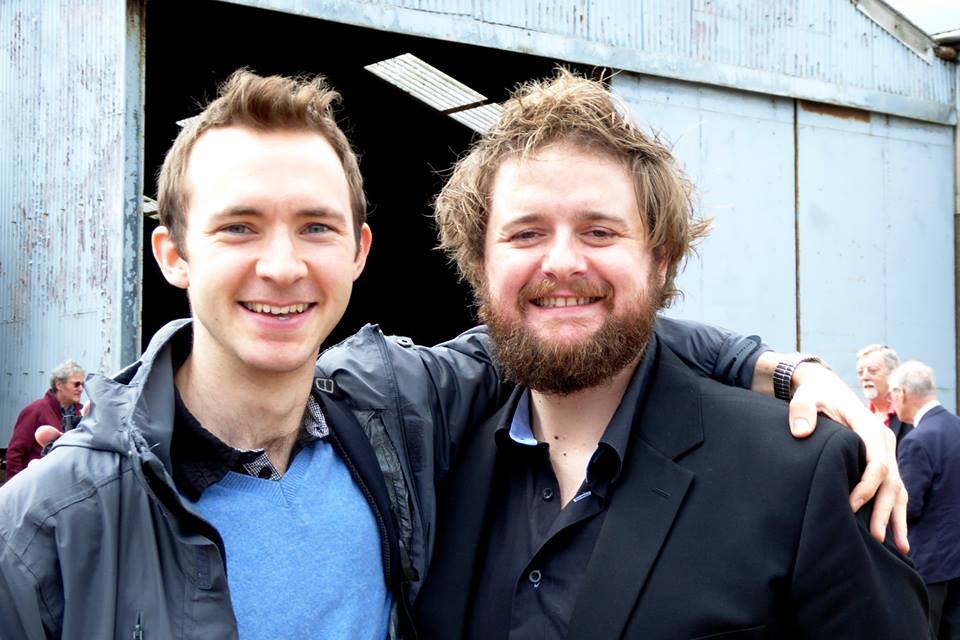 On the beach at Elie where the magnificent Schubert portrait had been sand-painted earlier in the week, I had the swim I had vowed to take: once round the bay to avoid the jellyfish of my first attempt, I found the immersion far less freezing than the Atlantic off the Portuguese coast weeks earlier and even managed to swim out to an unruffled flotilla of eider ducks. This was my indulgence during a buffet lunch in the Elie home of the MacDonalds - festival chairman Donald and his wife, natural, generous people, like all those connected with the festival I met in the East Neuk – which preceded the last concert. After its last notes, it was straight back to Edinburgh airport through rolling Fife landscapes in the company of a charming driver and Allan Clayton (pictured above outside the potato barn with Frank-Gemmill) again easy, interested, amusing - a no-airs-and-graces tenor alongside others of his brilliant generation.
On the beach at Elie where the magnificent Schubert portrait had been sand-painted earlier in the week, I had the swim I had vowed to take: once round the bay to avoid the jellyfish of my first attempt, I found the immersion far less freezing than the Atlantic off the Portuguese coast weeks earlier and even managed to swim out to an unruffled flotilla of eider ducks. This was my indulgence during a buffet lunch in the Elie home of the MacDonalds - festival chairman Donald and his wife, natural, generous people, like all those connected with the festival I met in the East Neuk – which preceded the last concert. After its last notes, it was straight back to Edinburgh airport through rolling Fife landscapes in the company of a charming driver and Allan Clayton (pictured above outside the potato barn with Frank-Gemmill) again easy, interested, amusing - a no-airs-and-graces tenor alongside others of his brilliant generation.
Cambo seduced me to want to return, though an Edinburgh friend warned me that off-season it could be melancholy in the company of disgruntled golfers. But horns around the formal garden promised for next year’s festival, and the added interest of a new masterclass scheme to bring young professional musicians to East Neuk to make chamber music with that fine and articulate violinist Alexander Janiczek in charge, mean that I’ll return if I can next summer.
- Plans for the 2015 Festival on the ENF website
- All four concerts in the Schubertiad to be broadcast on BBC Radio 3 later this year
- David Nice's blog on the Britten Serenade in the Gresham's woods last year
Explore topics
Share this article
more Classical music
 Bell, Perahia, ASMF Chamber Ensemble, Wigmore Hall review - joy in teamwork
A great pianist re-emerges in Schumann, but Beamish and Mendelssohn take the palm
Bell, Perahia, ASMF Chamber Ensemble, Wigmore Hall review - joy in teamwork
A great pianist re-emerges in Schumann, but Beamish and Mendelssohn take the palm
 First Persons: composers Colin Alexander and Héloïse Werner on fantasy in guided improvisation
On five new works allowing an element of freedom in the performance
First Persons: composers Colin Alexander and Héloïse Werner on fantasy in guided improvisation
On five new works allowing an element of freedom in the performance
 First Person: Leeds Lieder Festival director and pianist Joseph Middleton on a beloved organisation back from the brink
Arts Council funding restored after the blow of 2023, new paths are being forged
First Person: Leeds Lieder Festival director and pianist Joseph Middleton on a beloved organisation back from the brink
Arts Council funding restored after the blow of 2023, new paths are being forged
 Classical CDs: Nymphs, magots and buckgoats
Epic symphonies, popular music from 17th century London and an engrossing tribute to a great Spanish pianist
Classical CDs: Nymphs, magots and buckgoats
Epic symphonies, popular music from 17th century London and an engrossing tribute to a great Spanish pianist
 Sheku Kanneh-Mason, Philharmonia Chorus, RPO, Petrenko, RFH review - poetic cello, blazing chorus
Atmospheric Elgar and Weinberg, but Rachmaninov's 'The Bells' takes the palm
Sheku Kanneh-Mason, Philharmonia Chorus, RPO, Petrenko, RFH review - poetic cello, blazing chorus
Atmospheric Elgar and Weinberg, but Rachmaninov's 'The Bells' takes the palm
 Daphnis et Chloé, Tenebrae, LSO, Pappano, Barbican review - lighting up Ravel’s ‘choreographic symphony’
All details outstanding in the lavish canvas of a giant masterpiece
Daphnis et Chloé, Tenebrae, LSO, Pappano, Barbican review - lighting up Ravel’s ‘choreographic symphony’
All details outstanding in the lavish canvas of a giant masterpiece
 Goldscheider, Spence, Britten Sinfonia, Milton Court review - heroic evening songs and a jolly horn ramble
Direct, cheerful new concerto by Huw Watkins, but the programme didn’t quite cohere
Goldscheider, Spence, Britten Sinfonia, Milton Court review - heroic evening songs and a jolly horn ramble
Direct, cheerful new concerto by Huw Watkins, but the programme didn’t quite cohere
 Marwood, Power, Watkins, Hallé, Adès, Bridgewater Hall, Manchester review - sonic adventure and luxuriance
Premiere of a mesmeric piece from composer Oliver Leith
Marwood, Power, Watkins, Hallé, Adès, Bridgewater Hall, Manchester review - sonic adventure and luxuriance
Premiere of a mesmeric piece from composer Oliver Leith
 Elmore String Quartet, Kings Place review - impressive playing from an emerging group
A new work holds its own alongside acknowledged masterpieces
Elmore String Quartet, Kings Place review - impressive playing from an emerging group
A new work holds its own alongside acknowledged masterpieces
 Gilliver, LSO, Roth, Barbican review - the future is bright
Vivid engagement in fresh works by young British composers, and an orchestra on form
Gilliver, LSO, Roth, Barbican review - the future is bright
Vivid engagement in fresh works by young British composers, and an orchestra on form
 Josefowicz, LPO, Järvi, RFH review - friendly monsters
Mighty but accessible Bruckner from a peerless interpreter
Josefowicz, LPO, Järvi, RFH review - friendly monsters
Mighty but accessible Bruckner from a peerless interpreter
 Cargill, Kantos Chamber Choir, Manchester Camerata, Menezes, Stoller Hall, Manchester review - imagination and star quality
Choral-orchestral collaboration is set for great things
Cargill, Kantos Chamber Choir, Manchester Camerata, Menezes, Stoller Hall, Manchester review - imagination and star quality
Choral-orchestral collaboration is set for great things

Add comment